Geek/Nerdity Tests
Though there are quite a few geek/nerdity1 tests around, most seem to be written by wannabes or nots. The only one I've ever given any real credence is The [Infamous] Nerdity Test and its ancestors. This is in part, however, because it's so old--also its biggest flaw.
These days, such tests ask about playing video games or writing web pages. Things done by geeks, but also by the least geeky people around. Back in the day, having played a computer game all night meant, for starters, that you had a home computer. Hardly a sign of geekdom these days.
The key to assigning a geek rating is less than ever to focus on computer ownership, or even computer knowledge. A book geek can be much geekier than most computer experts are. What you should focus on is prioritising and caring about such things. Cosplayers are geeky2--at least during their public cosplaying--because they put cosplaying above normality. They appear obsessed simply because they care more about enjoying their interests than in fitting in with the world at large.3
However, because we can't just enumerate the computer knowledge and hardware of a person to determine their nerdity quotient, assigning a value become difficult. There are countless things to be nerdy about, and a single test can't cover all of them.
In addition to being out-of-date and biased towards (or against, some might say) computer geeks and hard science geeks, the infamous test is also skewed towards people who've attended college, people who've had formal schooling, people who speak English (*shrug*), people rich enough to afford lots of equipment, and so on.
I've been meaning to make a better nerdity test for quite some time, but I'm not entirely sure how. Obviously updating the numbers would be a start (why, yes, I do have a computer with >1M[i]B RAM!), but that doesn't address the major issues. Maybe I should make seperare tests for different types of nerds, allowing scoring of at least some people, but then the dual-interest geeks and weird-interest geeks get unscored/misscored. That's unacceptible, as ones nerdity score is the most important number in ones life.
I'm roughly 53.4% on the infamous test, by the way.
1 There are lots of bad definitions for distinguishing geeks from nerds. There are also some good ones, but no good, standard way of distinguishing the two, and I don't feel like writing an essay on the distinction, anyway, just now. So I'll use them interchangeably. If you think this is a big problem, it's because you favour those stupid definitions.
2 Disclaimer: Anime sucks. Well, okay, I've seen very, very little, and I know there's a lot of good anime out there. I just don't watch it. Anime doesn't suck.
3 As an aside, I absolutely have to clarify something here4: many, many, many people these days are weird and profess theirselves nerdy, not because they're nerds, but because being weird makes them different == cool in an off-beat way. Or whatever. My point is that nerds are not weird for the sake of being weird. We're weird because we legitimately are interested in our interests, and won't sacrifice them, whether to fit in or to stand out. Many nerds throughout history have desired to fit in (while others just didn't care either way).
Certainly a nerd can be happy to be different, but abandoning ones interest because it becomes popular is as decidedly anti-nerdy as abandoning it because it's unpopular. The condition for being a nerd is that popularity is the primary consideration.5
4 So much for not writing a definitions essay. But I'll still use 'geek' and 'nerd' interchangeably.
5 This is clumsily stated and may be wrong with certain types of geekdom.
6 This footnote had nothing pointing to it. Why are you reading this footnote?7
7 This would be cleverer if my footnotes were slightly more 'hidden'.

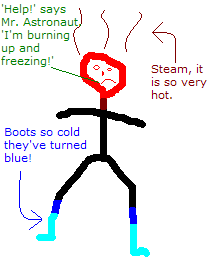 In Poul Anderson's 1957 short story 'The Light'1, the astronauts have cold feet.
In Poul Anderson's 1957 short story 'The Light'1, the astronauts have cold feet. The formerly-secular nation of Iraq underwent an upheaval in 2003 and recently elected a theocratic government. The US knows quite well that separation of church and state is one vital aspect of a free people, so we should attempt to bring this concept to Iraq, or at least parts of it.
The formerly-secular nation of Iraq underwent an upheaval in 2003 and recently elected a theocratic government. The US knows quite well that separation of church and state is one vital aspect of a free people, so we should attempt to bring this concept to Iraq, or at least parts of it.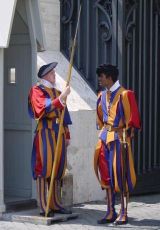
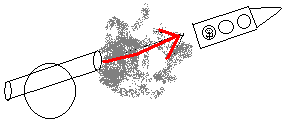 One distinguished author had the thought of launching the spaceship from a cannon. This has the benefit of not weighing the ship down with tons of fuel. It has the disadvantage of extreme acceleration--enough to kill the passengers--and (assuming you aim well) extreme deceleration--enough to squash or bury the passengers upon arrival.
One distinguished author had the thought of launching the spaceship from a cannon. This has the benefit of not weighing the ship down with tons of fuel. It has the disadvantage of extreme acceleration--enough to kill the passengers--and (assuming you aim well) extreme deceleration--enough to squash or bury the passengers upon arrival.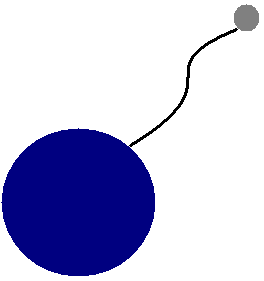 Another method worth considering would be to build a bridge. Space elevators are talked about a lot, but if you really want something useful, you should make a space elevator going all the way to the Moon's surface.
Another method worth considering would be to build a bridge. Space elevators are talked about a lot, but if you really want something useful, you should make a space elevator going all the way to the Moon's surface.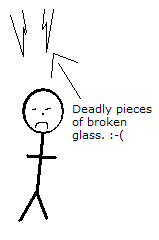 There was also an idea from a clever French poet noted for his oversized proboscis. He figured that in the morning, dew rose from the ground up to the Sun. So he figured we could fill a bunch of vials with dew, attach them to our hapless spaceman, and watch him float up into the sky come morning.
There was also an idea from a clever French poet noted for his oversized proboscis. He figured that in the morning, dew rose from the ground up to the Sun. So he figured we could fill a bunch of vials with dew, attach them to our hapless spaceman, and watch him float up into the sky come morning.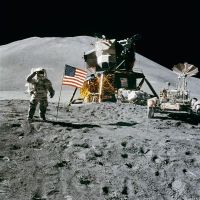 Lastly, there's the option of reviving the methods used by NASA. These, however, have the politically unpopular characteristic of being based on actual science, something the jury is still out on.
Lastly, there's the option of reviving the methods used by NASA. These, however, have the politically unpopular characteristic of being based on actual science, something the jury is still out on.